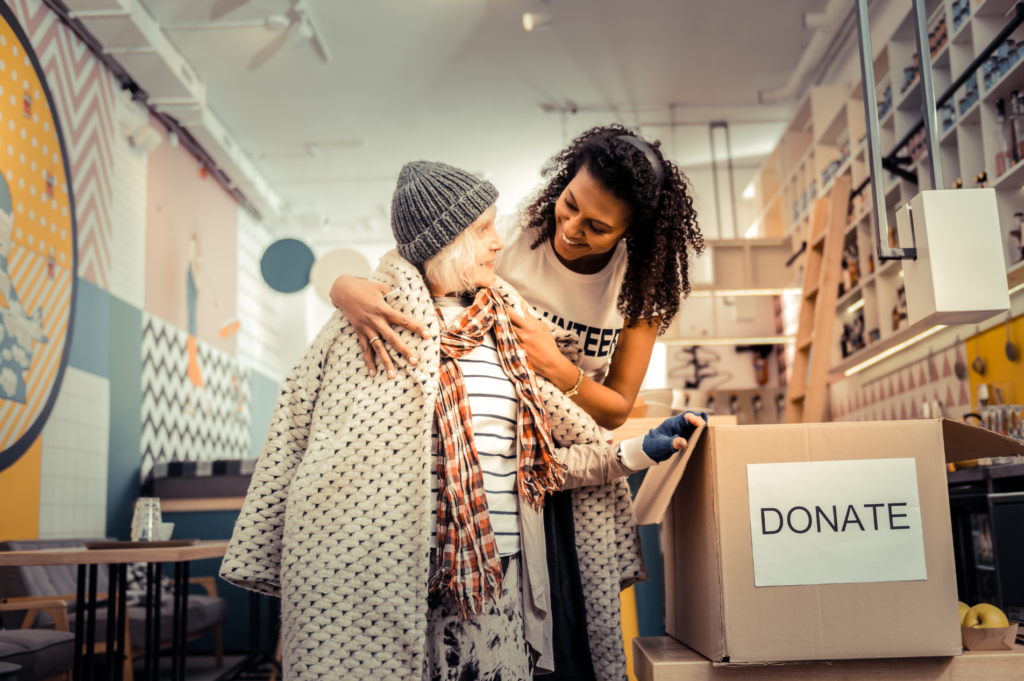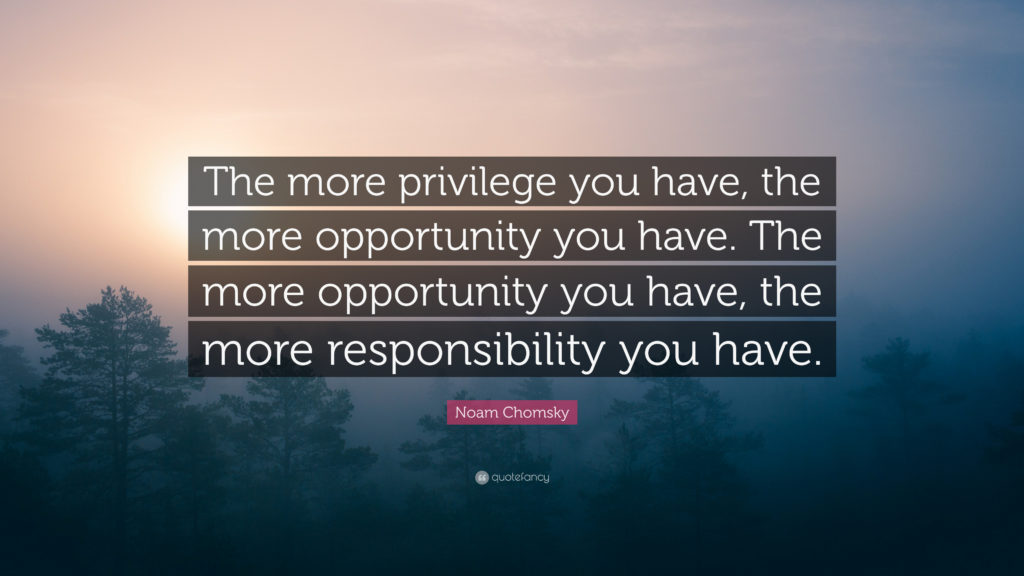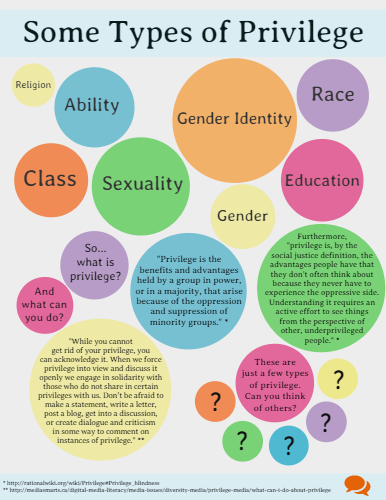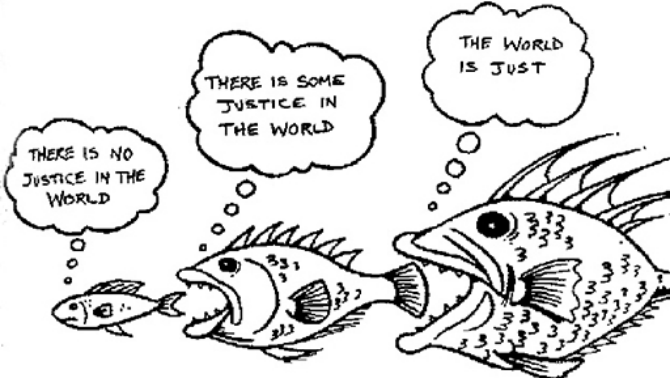
Reflecting on the privileges that you have, or don’t have, will bring a sense of gratitude and abundance. You’ll realize that you have a moral responsibility to use the advantages you benefit from, to bring about more fairness and equality in our world. Empathy will open your heart and motivate you to helps those belonging to marginalized groups. (Estimated reading time: 5 minutes)
“What separates privilege from entitlement is gratitude.”
— Brené Brown
Privilege is a relatively new concept to me. On some level, I was aware that a pecking order exists in society based on one’s socio-economic status and physical appearance, but I had no idea how privilege determined the opportunities I had, compared to others.
The everyday privileges I enjoy as a college-educated, able-bodied, heterosexual woman who grew up in an upper-middle-class family is something I took for granted. Instead, I complained about the privileges I didn’t have, like a passport that would allow me unrestricted travel to most countries without visas, or belonging to a culture that was open to unconventional ways of living.
As I grew up, it became evident how these descriptors opened many doors and gave me resources that many of my relatives who live in rural India could not have even dreamed of.
Unearned benefits granted to me because of the circumstances I was born into offered me the flexibility and freedom to carve my own path based on my personal values.

Just like me, there are privileges from which you benefit, and it’s crucial that you recognize them. If you’re open to it, you’ll see that certain aspects of your identity (your class, financial standing, generation, geography, race, language, citizenship, physical strength, appearance, age, sexual orientation, and religion) have collectively taken you up several rungs up on the privilege ladder.
Privilege is the secret underbelly of society that no one wants to face up to, or talk about. It used to be that privilege was equated with wealth and class, at a time when places were culturally and racially homogenous.
The struggles associated with an individual’s need to be “seen and heard” in society have been woven throughout the fabric of our history, and are still prevalent today. However, privilege has taken on a much broader meaning.
Our choice to turn a blind eye to inequalities that arise from these hierarchies have come into focus many times throughout history. Recently, the conversation about privilege as it relates to racial identity, has come front and center.
The explosive public reactions in response to the Black Lives Matter movement have made people aware of what it means to live in a society where you’re under constant scrutiny and racially profiled. Instead of viewing the police force as a source of safety and protection, people of color feel unjustly targeted and victimized.

This mass exposure of systemic racism has been positive because it has jump-started the conversation around ironing out the problems that exist in groups of power like businesses, schools, and governments.
It’s gone beyond just a passing social media trend that celebrities and influencers latch onto to show how “woke” and socially-aware they are. It’s more than just a ploy to boost their public image and reputation. Real progress is achieved by people who genuinely care and are willing to take action to make a difference.
Talking about privilege is not an easy conversation for many. In fact, it makes a lot of people defensive. Being asked to “check your privilege” shouldn’t be understood as an attack, however. Instead, it is a gentle nudge to understand the plight of marginalized groups and the struggles that they face. We need to see it as an opportunity to educate ourselves and bear witness to the harsh realities of those who experience the world differently.
Acknowledging your privilege is not meant to make you feel guilty—it’s not your fault that you inherited certain kinds of opportunities. Neither does it minimize the hardships and the lack of privileges you face in other areas of your life.
An attractive person might find privilege in how the world perceives them, but they might also have underlying health conditions that limit their movement. Privilege and limitation are individual to everyone and exist on a spectrum.

Grappling with the realities of privilege is an ongoing effort that should become a part of your development. Here are three reasons why it’s essential to be open to learning and challenging your privileges:
1. You don’t take your privileges for granted: Recognizing privilege involves being aware that some people have to work much harder for the opportunities that you take for granted. Most of us don’t recognize the advantages we receive through our place in society or the nature of our identity until we make a deliberate effort to acknowledge it.
It’s easier to notice the oppression and injustice we experience than our privileges. Playing the victim gets more attention and places the blame on someone else. While it’s important to stand up for our rights, we should simultaneously appreciate areas where we have it easier than others.
2. You become understanding and empathetic toward others: Checking your privilege is an act of compassion. It shows that you care about others and that you’re invested in others’ progress, not just your own. Instead of being in a limited, self-centered bubble, you become a member of an interconnected society that works together to improve the living conditions of everyone.
Educate yourself about the experiences of those people that society disenfranchises at the expense of those who become empowered. Although we can never fully grasp what it’s like to be disabled, trans, or a refugee unless we are part of those groups, we can draw from our experiences where we feel less privileged and show empathy.
3. The injustice in the system becomes more apparent: Certain people carry more privilege than others because of institutional oppression. That’s why it’s important to understand privilege not just on an individual level, but in the context of power systems like patriarchy, classicism, and racial supremacy. These parts of society have power over the oppressed because they usually dominate politics, the media, executive boards, and are economically well-off.
This gives them the leverage to use their positions of authority to benefit people like themselves and overlook the less represented. Because there are fewer women and minorities represented in places of power, there are fewer regulations and laws to protect them and provide opportunities to elevate themselves. This awareness allows us to frame a dialogue for change, that’s meaningful and accessible.
Reflecting on the privileges that you have, or don’t have, will bring a sense of gratitude and abundance. You’ll realize that you have a moral responsibility to use the advantages you benefit from, to bring about more fairness and equality in our world. Empathy will open your heart and motivate you to take your place in the chains of humanity that bind us on one.
All my best on your journey,
Seline

Question for you: How does thinking about your privilege impact your life? Does it make you see yourself and your life differently?
Did you like this post? Sign up below, and I’ll send you more awesome posts like this every week

Nice post. I think with all this talk about white privilege and minorities and suppressed groups like Blacks and LGBTQ it is also important to remember there are all types of privilege. It can be financial, social status, job title, education, family support, and the list goes on and on. Most people have one way they are blessed with some kind of privilege and others have other privileges. Appreciate you Seline.
I agree. 100% agree! Some people are privileged and have a advantage from the start due to more than just their race. Someone may be born into a wealthy family. Someone may have parents who are educators or have connections in their hometown. Someone may be raised with a loving family. There are so many things that can give you a head start and an advantage if you have them and that can also be a major disadvantage when you do not have them. I think more people need to understand this.